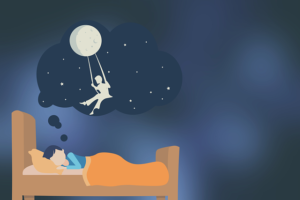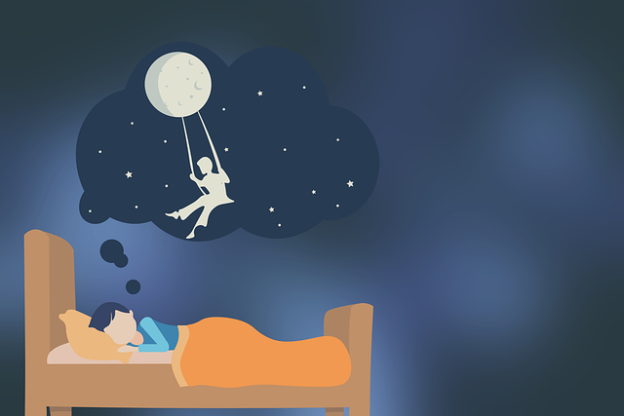It’s normal to feel stressed or anxious at times, but it can be hard to get a good night’s sleep when you’re feeling overwhelmed.
Sleep is essential for overall health, so it’s important to find ways to relax and unwind in order to get the restful night’s sleep your body needs. This article will discuss how to sleep when you’re feeling stressed and anxious, and provide tips for getting better quality sleep.
Practice Relaxation Techniques
 When you’re feeling stressed and anxious, it can be difficult to get a good night’s sleep. Fortunately, there are a few relaxation techniques that can help you relax and drift off into dreamland.
When you’re feeling stressed and anxious, it can be difficult to get a good night’s sleep. Fortunately, there are a few relaxation techniques that can help you relax and drift off into dreamland.
Deep breathing is one of the simplest yet most effective ways to relax your body and mind. Taking slow, deep breaths helps activate the parasympathetic nervous system, which puts your body in a state of relaxation. You can also try progressive muscle relaxation, which involves tensing and releasing different muscle groups one at a time. Doing this for a few minutes before bed can help calm your mind and prepare you for restful sleep. To further aid in relaxation, take some time before bed to do something calming like reading or listening to soothing music. These activities create a sense of peace and comfort that will help make it easier for you to fall asleep.
These relaxation techniques can be helpful tools when trying to fall asleep after feeling stressed or anxious. By incorporating these practices into your nightly routine, you’ll be on your way to getting more peaceful sleep each night.
Exercise Regularly
Exercising regularly is an essential part of managing stress and anxiety. Not only does physical activity release endorphins, which can improve your mood, but it also helps to regulate your body’s internal rhythms, giving you better quality sleep. Exercise also tires out your body so that you can fall asleep more easily. It is recommended to do some form of exercise for at least 30 minutes every day, though strenuous exercise should be done at least four hours before bedtime. Additionally, exercising earlier in the day will give you a stronger sense of accomplishment and increase your energy levels throughout the day so that you are not as exhausted when it comes time to go to sleep.
Avoid Stimulants And Alcohol
It’s important to avoid stimulants and alcohol when trying to fall asleep when feeling stressed and anxious. Stimulants, such as caffeine, can keep you from falling asleep because they increase alertness and energy, making it difficult for your body to relax. Alcohol may initially make you feel drowsy, but it’s effects are short-lived and can disrupt your sleep cycle later on in the night. Try avoiding coffee, tea, energy drinks, and other caffeinated beverages at least 4 hours before bedtime. It’s best to avoid alcohol all together before going to bed if you are having trouble with stress or anxiety-related insomnia.
Develop A Sleep Routine
Creating a sleep routine is an important step to help manage stress and anxiety. It can be difficult to find the motivation to stick with the routine but it is worth it in the long run. Start by setting a consistent bedtime and wake-up time, even on weekends. Try to avoid napping during the day as it may make it harder for you to fall asleep at night. Additionally, limit your exposure to screens before bed — this includes turning off your television, computer, cell phone, and any other devices that emit blue light which can disrupt your body’s circadian rhythm.
Relaxation techniques such as deep breathing or progressive muscle relaxation (PMR) can also help you wind down before going to bed. PMR involves tensing and relaxing different muscle groups throughout your body starting from your feet up until your head. This helps reduce tension while calming both your mind and body. Doing this routinely helps create a habit of relaxation which will become easier over time. Take some time each day to practice these techniques so that they become second nature when you need them in moments of stress or anxiety.
Seek Professional Help
Having a consistent nighttime routine is an effective way to help manage stress and anxiety while trying to sleep. It’s important to create a calming environment by turning off all screens, keeping the bedroom dark, and focusing on relaxation techniques such as deep breathing or stretching. However, if your stress and anxiety levels are still too high after implementing a sleep routine, it may be time to seek professional help.
Talking with a mental health professional can provide valuable insight into how to address issues that are causing elevated levels of stress and anxiety. Working with a therapist can also equip you with new skills for managing stress and improving your sleep habits. They may suggest additional techniques such as progressive muscle relaxation or mindfulness-based practices which can be helpful in reducing stress and calming the mind before bedtime.
How Do I Know If I Need Professional Help For My Sleep Problems?
If you’re struggling to get a good night’s sleep, it can be difficult to know when it’s time to seek professional help. Generally, if the problem persists and your sleep deprivation is impacting your day-to-day life and mental health, then it may be time to seek professional help. If you have tried several home remedies such as avoiding screens before bed, or using relaxation techniques with no success, these could be signs that you need additional assistance. Additionally, if your sleep problems are accompanied by other symptoms such as anxiety or depression, then this could also be an indication that you need further help.
Can Exercise Help With Stress And Anxiety?
Exercise can be a great way to manage stress and anxiety. It has been proven to reduce feelings of tension, improve mood, and increase self-confidence. By getting your heart rate up and breaking a sweat, you can help release endorphins, which are the body’s natural feel-good hormones. Research also suggests that regular exercise can help reduce symptoms of stress and anxiety over time. So if you’re feeling overwhelmed or anxious, try hitting the gym or going for a run – it might just make you feel better!
How Much Rest Do I Need To Feel Well-Rested?
If you’re wondering how much rest you need to feel well-rested, the answer is going to vary from person to person. Generally speaking, adults should get around 7-8 hours of sleep a night in order to feel their best. However, some may require more or less depending on their individual needs and lifestyle. It’s important to listen to your body and adjust the amount of rest accordingly in order to make sure you’re getting enough sleep.
What Type Of Relaxation Techniques Are Most Effective?
Relaxation techniques can be an effective way to reduce stress and anxiety. Popular methods include deep breathing, progressive muscle relaxation, guided imagery, meditation, yoga, and mindfulness. Deep breathing involves taking long, slow breaths to help relax your body and mind. Progressive muscle relaxation is when you tense and relax each muscle group in your body one at a time. Guided imagery involves creating mental images of calming or peaceful settings to help bring about relaxation. Meditation helps you focus on the present moment without judgment or distraction by thoughts. Yoga combines physical postures with breath control and meditation for overall relaxation of both the mind and body. Mindfulness is being aware of your thoughts and feelings without judging them as good or bad.
Are There Any Natural Remedies For Stress And Anxiety?
When feeling stressed and anxious, it is important to find natural remedies that can help alleviate those feelings. There are many different relaxation techniques that can be used to reduce stress and anxiety levels, such as deep breathing exercises, meditation, yoga and mindfulness activities. Herbal remedies like chamomile, lavender, passionflower and kava kava have also been found to be effective for reducing stress and calming the mind. Additionally, exercise can be a great way to release endorphins which help promote feelings of well-being.
I’ve gone over some ways to help sleep when feeling stressed and anxious. It’s important to remember that everyone experiences stress and anxiety differently, so finding a solution that works for you is key. If your sleep problems persist or become worse, it may be time to seek professional help. Exercise, good sleep hygiene, relaxation techniques, and natural remedies can all be effective in calming the mind and body before bedtime. With a little bit of effort, you can get the restful sleep your body needs to function properly.








